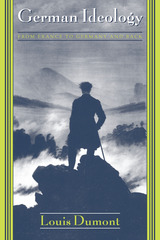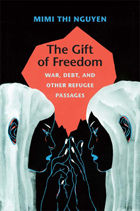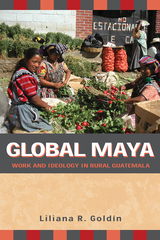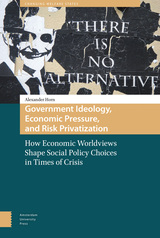119 books about Ideology and 5
start with G
119 books about Ideology and 5
119 books about Ideology
5 start with G start with G
5 start with G start with G

Genesis of The Brothers Karamazov
The Aesthetics, Ideology, and Psychology of Making a Text
Robert L. Belknap
Northwestern University Press, 1990
Robert L. Belknap is the author of The Structure of "The Brothers Karamazov," which is generally regarded as one of the best studies on Dostoevsky produced by the present generation of scholars. The Genesis of "The Brothers Karamazov" continues and complements Belknap's earlier work, tracing Dostoevsky's last, great novel to its sources and exploring the works Dostoevsky read and consciously employed in constructing it.
[more]

German Ideology
From France to Germany and Back
Louis Dumont
University of Chicago Press, 1995
In this comparative anthropological analysis, Louis Dumont illuminates German and French ideology, European culture, and cultural interaction. His analysis of texts by Troeltsch, Thomas Mann, Goethe, and others, against the background of previously gathered evidence and of French common notions, specify the differences—otherwise frequently but vaguely alluded to—between French and German cultures.
Anyone interested in the fate of national ideology and the concept of the individual will benefit from this radical reinterpretation of modern values and the place of modernity in history.
"What François Furet did for French history, Dumont did for anthropology, turning it away from engaged politics and towards the sober study of the modern age." —Mark Lilla, London Review of Books
"There are many fine things in Dumont's study. Beyond any doubt, his cultural anthropology of the modern spirit highlights some of the key energies of the of the last two centuries. . . . [An] impressive . . . detailed analysis." —Martin Swales, Times Higher Education Supplement
"[An] unsettling, rich, demanding, profound study." —Publishers Weekly
Anyone interested in the fate of national ideology and the concept of the individual will benefit from this radical reinterpretation of modern values and the place of modernity in history.
"What François Furet did for French history, Dumont did for anthropology, turning it away from engaged politics and towards the sober study of the modern age." —Mark Lilla, London Review of Books
"There are many fine things in Dumont's study. Beyond any doubt, his cultural anthropology of the modern spirit highlights some of the key energies of the of the last two centuries. . . . [An] impressive . . . detailed analysis." —Martin Swales, Times Higher Education Supplement
"[An] unsettling, rich, demanding, profound study." —Publishers Weekly
[more]

The Gift of Freedom
War, Debt, and Other Refugee Passages
Mimi Thi Nguyen
Duke University Press, 2012
In The Gift of Freedom, Mimi Thi Nguyen develops a new understanding of contemporary United States empire and its self-interested claims to provide for others the advantage of human freedom. Bringing together critiques of liberalism with postcolonial approaches to the modern cartography of progress, Nguyen proposes "the gift of freedom" as the name for those forces that avow to reverence aliveness and beauty, and to govern an enlightened humanity, while producing new subjects and actions—such as a grateful refugee, or enduring war—in an age of liberal empire. From the Cold War to the global war on terror, the United States simultaneously promises the gift of freedom through war and violence and administers the debt that follows. Focusing here on the figure of the Vietnamese refugee as the twice-over target of the gift of freedom—first through war, second through refuge—Nguyen suggests that the imposition of debt precludes the subjects of freedom from escaping those colonial histories that deemed them "unfree." To receive the gift of freedom then is to be indebted to empire, perhaps without end.
[more]

Global Maya
Work and Ideology in Rural Guatemala
Liliana R. Goldín
University of Arizona Press, 2009
In the central highland Maya communities of Guatemala, the demands of the global economy have become a way of life. This book explores how rural peoples experience economic and cultural change as their country joins the global market, focusing on their thoughts about work and sustenance as a way of learning about Guatemala’s changing economy.
For more than a decade, Liliana Goldín observed in highland towns both the intensification of various forms of production and their growing links to wider markets. In this first book to compare economic ideology across a range of production systems, she examines how people make a living and how they think about their options, practices, and constraints. Drawing on interviews and surveys—even retellings of traditional narratives—she reveals how contemporary Maya respond to the increasingly globalized yet locally circumscribed conditions in which they work.
Goldín presents four case studies: cottage industries devoted to garment production, vegetable growing for internal and border markets reached through direct commerce, crops grown for export, and wage labor in garment assembly factories. By comparing generational and gendered differences among workers, she reveals not only complexities of change but also how these complexities arereflected in changing attitudes, understandings, and aspirations that characterize people’s economic ideology. Further, she shows that as rural people take on diverse economic activities, they also reinterpret their views on such matters as accumulation, cooperation, competition, division of labor, and community solidarity.
Global Maya explores global processes in local terms, revealing the interplay of traditional values, household economics, and the inescapable conditions of demographic growth, a shrinking land base, and a global economy always looking for cheap labor. It offers a wealth of new insights not only for Maya scholars but also for anyone concerned with the effects of globalization on the Third World.
For more than a decade, Liliana Goldín observed in highland towns both the intensification of various forms of production and their growing links to wider markets. In this first book to compare economic ideology across a range of production systems, she examines how people make a living and how they think about their options, practices, and constraints. Drawing on interviews and surveys—even retellings of traditional narratives—she reveals how contemporary Maya respond to the increasingly globalized yet locally circumscribed conditions in which they work.
Goldín presents four case studies: cottage industries devoted to garment production, vegetable growing for internal and border markets reached through direct commerce, crops grown for export, and wage labor in garment assembly factories. By comparing generational and gendered differences among workers, she reveals not only complexities of change but also how these complexities arereflected in changing attitudes, understandings, and aspirations that characterize people’s economic ideology. Further, she shows that as rural people take on diverse economic activities, they also reinterpret their views on such matters as accumulation, cooperation, competition, division of labor, and community solidarity.
Global Maya explores global processes in local terms, revealing the interplay of traditional values, household economics, and the inescapable conditions of demographic growth, a shrinking land base, and a global economy always looking for cheap labor. It offers a wealth of new insights not only for Maya scholars but also for anyone concerned with the effects of globalization on the Third World.
[more]

Government Ideology, Economic Pressure, and Risk Privatization
How Economic Worldviews Shape Social Policy Choices in Times of Crisis
Alexander Horn
Amsterdam University Press, 2017
From the 1980s on, a privatization of labor market-related risks has occurred in the OECD. Governments have cut the generosity of social programs and tightened eligibility rules, particularly for the unemployed. Government Ideology, Economic Pressure, and Risk Privatization: How Economic Worldviews Shape Social Policy Choices in Times of Crisis analyses these curtailments for eighteen countries over the course of four decades and provides an encompassing comparative assessment of the interactive impact of government ideology and economic pressure. It demonstrates that the economic worldviews of governments are the most important factor in explaining why cuts are implemented or not. While ideas of non-intervention in the market underlie cuts in generosity, ideas of equality and fairness are at the heart of stricter eligibility criteria. This book also shows that the impact of the economic pressures often held responsible for the marginalization of politics and government ideology is in fact conditional on the specific ideological configuration.
[more]
READERS
Browse our collection.
PUBLISHERS
See BiblioVault's publisher services.
STUDENT SERVICES
Files for college accessibility offices.
UChicago Accessibility Resources
home | accessibility | search | about | contact us
BiblioVault ® 2001 - 2024
The University of Chicago Press









